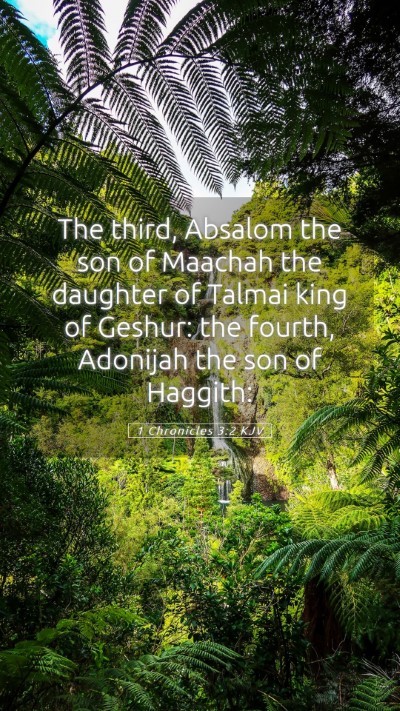Understanding 1 Chronicles 3:2
This verse states: "Daniel’s sons, Hushim and Ahitub.” This verse is part of a genealogical record that sets the stage for understanding the lineage of significant biblical figures.
Bible Verse Meanings
1 Chronicles 3:2 is a concise yet rich verse that forms part of a larger narrative within 1 Chronicles, which details the genealogies of the tribes of Israel, particularly focusing on the lineage of David. Understanding this verse involves recognizing the importance of genealogy in biblical texts, as it often conveys more than just lineage; it establishes God’s covenant relationship with His people.
Bible Verse Interpretations
- Significance of Genealogy: Matthew Henry emphasizes that genealogical records serve a dual purpose; they not only document lineage but demonstrate God's faithfulness in preserving His promises through generations.
- Preservation of God’s People: Albert Barnes notes that recording lineages, particularly that of David, underscores God's providence in maintaining a remnant of His chosen people. This aspect is critical for understanding biblical history and God's unfolding plan.
- Symbolism of Names: Adam Clarke elaborates on the names mentioned and their meanings, which often reflect the character or destiny of the individuals involved, enriching the narrative with deeper insights into their roles in God's story.
Understanding Scripture
To fully grasp the significance of 1 Chronicles 3:2, one must consider the cultural and historical context of ancient Israel. Names held immense significance in this society, often reflecting attributes or circumstances surrounding the individual. Thus, the mention of Daniel's sons not only identifies lineage but may also highlight their potential roles in the unfolding story of Israel’s history.
Bible Study Insights
When engaging with this verse in Bible study groups, it can open discussions about the nature of heritage and how it influences one's identity in faith. This verse invites believers to ponder their spiritual lineage and the impact of their faith on future generations.
In-Depth Bible Verse Analysis
1 Chronicles, as a whole, is concerned with establishing the legitimacy of David's line and, by extension, the Messiah. Therefore, studying the context of 1 Chronicles 3:2 is essential for anyone looking to understand the development of biblical themes, including God’s covenant, the role of lineage, and the significance of fulfilling promises.
Historical Context of Bible Verses
In the ancient world, genealogy was a crucial aspect of societal structure, determining inheritance rights and serving as a way to validate authority. This is particularly true for David’s line, which is emphasized throughout the scriptures to validate Jesus’s claim as the Messiah.
Cross References
- Genesis 49:10: Discusses the scepter not departing from Judah, highlighting the importance of lineage in the Messianic context.
- Matthew 1:1-17: The New Testament genealogy of Jesus, confirming the fulfillment of the Old Testament promise through David's lineage.
- Luke 3:23-38: Provides another genealogical account, emphasizing the importance of Jesus's rightful place in the lineage of Israel.
Application of Bible Verses:
Reflecting on 1 Chronicles 3:2 can lead to practical applications in our lives. Recognizing our spiritual lineage encourages us to understand our place in God’s story and our responsibilities towards future generations. It urges us to consider how our actions and faith can influence our descendants.
Bible Study Resources: Engaging with this verse can be further enhanced through various Bible study tools and guides that focus on genealogical studies and the theological implications of lineage. Utilizing online Bible study platforms can provide rich resources for understanding the depth of scripture and its relevance in today’s context.


